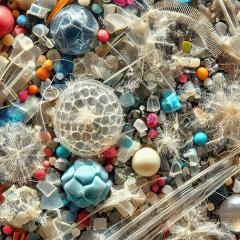Removal of MNPs (micro and nano plastics ) from contaminated water systems by foam fractionation/froth flotation
Micro and nano plastics (MNPs) entering ecosystems due to coastal, industrial, and domestic activities, become a threat to the environment. Developing a reliable and fast MNPs synthesis method is vital for conducting quality experiments to understand the fate and behavior of MNPs in the environment. The MNPs reference materials that are produced for instrument calibration purposes do not fit the criteria to mimic particles produced in nature. The initial scope of the research is on finding and developing a suitable methodology for producing synthetic MNPs in the laboratory environment. The dumping of sludge/biosolids produced during wastewater treatment directly into landfills becomes a source of microplastics into leachates, which eventually find their way into the wastewater treatment systems. This closed-loop and cyclic process results in a continuous increase of MNPs loading into the wastewater treatment system. There is a lack of comprehensive study on the removal efficiency of MPs from the leachate treatment plants. Hence a reliable and efficient separation process is necessary to decrease the MNPs load. Stormwater is considered a major land based MNPs source to the water bodies. Currently, there is no active system for stormwater treatment, and untreated stormwater feeds directly to creeks and rivers. This research also aims to look at a suitable treatment train for stormwater treatment. Due to low density and hydrophobic properties, the foaming systems are seemly low-cost treatment systems for the removal of MNPs from stormwater and landfill leachates. Although significant studies are available on microplastic removal through this technique, no clear explanation existed on the bubble-plastic particle adhesion and their transport phenomena in the foaming system. The overall aim of this research is to understand the application of foam flotation for the removal of micro and nano plastics from the MNPs contaminated water systems (mainly stormwater and landfill leachates) and develop the experimental conditions to improve the flotation performance.
Please note this is a PhD confirmation milestone review.

